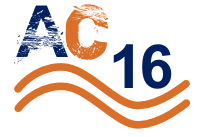
Workshop on Approximate Computing
Pittsburgh, PA, USA, October 06, 2016
AC16 is part of ESWEEK 2016
Past Events: 2015
You are here:
Program
9:00 - 10:00 Opening and Keynote
- Chair: Hans-Joachim Wunderlich, University of Stuttgart, Germany
- Opening Remarks
Sybille Hellebrand, University of Paderborn, Germany - Keynote: Approximate Computing: Ready for Prime Time?
Anand Raghunathan, Purdue University, USA
- Chair: Hans-Joachim Wunderlich, University of Stuttgart, Germany
10:00 - 10:30: Coffee and Posters
- Approximate Computing: Facing The Control Flow
M. Ammar Ben Khadra, Dominik Stoffel and Wolfgang Kunz
University of Kaiserslautern, Germany - Towards Approximate Computing Applications by Employing Mutation Code Approach
Mario Barbareschi1,2, Domenico Amelino1,2, Antonino Mazzeo1,2 and Alberto Bosio3
1DIETI - University of Naples Federico II, Italy, 2CeRICT scrl - Centro Regionale Information, Communication Technology, 3LIRMM, France - The Gamma multiset rewriting paradigm: a parallel approximate computing framework
Gabriel Paillard1, Rubens Almeida2, Rui Mello Junior2 and Felipe França3
1Federal University of Ceara (UFC), 2Brazil, Brazilian Navy Research Institute (IPqM), Rio de Janeiro, 3Brazil, Federal University of Rio de Janeiro (UFRJ), Brazil - Data Driven Optimizations for MTJ based Stochastic Computing
Ankit Mondal and Ankur Srivastava
University of Maryland, College Park, MD, USA - Weather and Climate Simulations with Approximate Computing
Stephen Jeffress, Tim Palmer and Peter Duben
University of Oxford, Department of Atmospheric Physics, UK
- Approximate Computing: Facing The Control Flow
10:30 - 12:30: Session 1: Multi-Level Design and Test
- Chair: Jörg Henkel, KIT, Germany
- Data Dependent Loop Approximation Technique in High-Level Synthesis
Seogoo Lee, Lizy K. John and Andreas Gerstlauer
The University of Texas at Austin, USA - Multi-Level Approximation for Inexact Accelerator Synthesis Under Voltage Island Constraints
Georgios Zervakis, Sotirios Xydis, Vasileios Tsoutsouras, Dimitrios Soudris and Kiamal Pekmestzi
School of Electrical and Computer Engineering, National Technical University of Athens, Greece - Hardware/Software Co-Characterization for Approximate Computing
Alexander Schöll, Claus Braun and Hans-Joachim Wunderlich
University of Stuttgart, Germany - A Case Study on the Approximate Test of Integrated Circuits
Imran Wali1, Arnaud Virazel1, Patrick Girard1, Mario Barbareschi2 and Alberto Bosio1
1LIRMM, France, 2DIETI - University of Naples Federico II, Italy
- Chair: Jörg Henkel, KIT, Germany
12:30 - 14:00: Lunch
14:00 - 15:30: Session 2: Near Memory Computing and Deep Learning
- Chair: Marco Platzner, University of Paderborn, Germany
- NAX: Near Data Approximate Computing
Amir Yazdanbakhsh1, Choungki Song2, Pejman Lotfi-Kamran3, Hadi Esmaeilzadeh1, Nam Sung Kim4 and Jake Sacks1
1Georgia Institute of Technology, USA, 2University of Wisconsin-Madison, USA, 3Institute for Research in Fundamental Sciences (IPM), USA, 4University of Illinois, Urbana-Champaign, USA - Approximate Computing in Deep Neural Networks
Hokchhay Tann, Soheil Hashemi, Iris Bahar and Sherief Reda
Brown University, USA - Using deep learning and imprecise computation for safety critical applications
Chi-Sheng Daniel Shih1, Chang-Min Yang1, Chun-Yo Lin1, Pei-Kuei Tsung2 and Roy Ju2
1Department of Computer Science and Information Engineering, National Taiwan University, 2MediaTek Inc. Taiwan
- Chair: Marco Platzner, University of Paderborn, Germany
15:15- 15:45 Coffee Break
16:00 - 17:30: Session 3: Applications
- Chair: TBA
- Trading sharpness with energy consumption in a lens autofocus application
Anca Molnos, Yves Durand and Nicolas Gonthier (Presenter: Christian Fabre)
Univ. Grenoble Alpes, Grenoble, France. CEA - LETI, MINATEC Campus, Grenoble, France - Numeric Function Approximation with Separate Accuracy Domains
Jochen Rust and Steffen Paul
Institute of Electrodynamics and Microelectronics (ITEM), University of Bremen, Germany - Using Approximate Computing in Scientific Codes
Michael Lass, Thomas D. Kühne and Christian Plessl
University of Paderborn, Germany
- Chair: TBA
© Copyright 2016 University of Paderborn / Datentechnik
